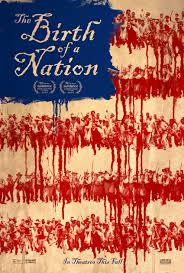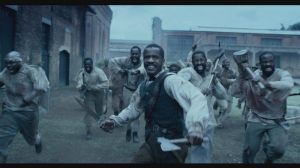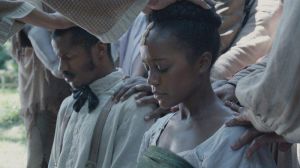The Birth of Nation (2016)
"The Birth of a Nation" was released on October 7, 2016 (U.S.). This film is adapted from the true story of Nat Turner, who was written, produced and directed by Nate Parker. Nate Parker played the role of Nat Turner in this film. "The Birth of a Nation" also played Armie Hammer and Samuel Turner, Colman Domingo as Hark, and Aya Naomi King who played Cherry, Jackie Earle Haley played Raymond Cobb, Penelope Ann Mille played As Elizabeth Turner, Gabrielle Union played Esther. "The Birth of a Nation" retells the slave rebellion of 1831 led by Nat Turner, an enslaved Baptist missionary who lives in a Virginia plantation owned by Samuel Turner.
The film won the Audience Award and Jury Award in the American category. Drama competition at the 2016 Sundance Film Festival. It has also received several nominations, including the 2017 Black Reel Award Nate Parker's outstanding film actor, outstanding film director and outstanding film script.[1]
Contents
Plot
In 1809, Nat Turner was a male slave on a farm in Southampton County, Virginia. None of Nat's children had enough food. Nat's father Isaac saw that Nat was hungry, so one night, he sneaked out and stole some food. Isaac was caught by Raymond Cobb. When Cobb tried to execute him, Isaac turned the table, killed one of his own people, and ran away. He went home, told his family what had happened, and said that he must leave his family immediately. But instead of talking to Nat, she insisted that Nat is a "child of God" and has a mission. When Cobb arrived and asked Isaac's family where he was, no one said anything.
At the same time, Benjamin Turner, the owner of the property, deliberately intervened in the extramarital affairs before Cobb went ahead. When Benjamin's wife Elizabeth Turner saw that Nat had basic reading skills, she began to teach him to read, hoping that she could use her experience to help with family affairs. Elizabeth's biblical-centered speech even made Nat read the scriptures at church meetings. Later, Benjamin Turner died, so Nat was taken to the Turner family to work on the farm.
Many years later, even though Nat was picking cotton with his family in the fields, Nat was still a devout missionary and had enough friendship with his master Samuel to persuade him to buy a young slave cherry (Cherry Cherry). ), to save her from fate, far worse than she has endured. Eventually they got married and had a daughter named Joanna.
During Nat's preaching journey, he realized the cruel treatment of their slaves by the plantation owners. Nat and Samuel watched as a man shattered all the teeth of the slave and pushed it into the funnel. In another case, he saw a friend of Samuel asking for a married slave Esther (Gabriel Union) to come to his residence. Later, when her husband went to comfort her and asked where Nat was now, she shed tears.
Cobb and his men found cherries in the woods to do housework. They beat and raped her violently. Nat went home and lay on the bed and found her face. Nat's preaching became more enthusiastic, but he no longer took any care of the master, and then gathered many slaves and rounded them. Get up at night. They were going to Samuel's house, and Nat hit him with an axe. Samuel was crawling out of his room before succumbing to the wound. The slaves will go to many houses to kill the white people. A slave beheaded a person at his door. A group of white men found slaves in the woods and started shooting at them after a young slave boy told them of Nat's behavior.
In the morning, they were suddenly ambushed by soldiers, and they killed all the slaves except the fugitive Nat. When they watched Nat being taken to his grave, the black man was quiet. When asked if he still had a last word, he just replied: "I'm ready." Nat was hanged, and the last thing he saw was Cherry in the form of an angel. Then we saw that the boy warned these people in advance during the uprising, watching with tears in his eyes. When he fought with other black soldiers in the Civil War, the last bounce was in his adulthood.
Controversy
Rebecca Carroll in The Guardian thinks that Nate Parker has failed to reshape history. Her argument is that we don’t have to kill white people, we need to kill slavery. And systemic racism. "Slavery has evolved in modern America, but we black Americans are also evolving. We don’t need to kill whites in order to achieve freedom. We need to kill slavery and systemic racism in order to continue to preserve human life. Its legacy. In a country in history that doesn’t see us as a human being."[2]
Michael Phillips on Chicago Tribun also has several "not so good" response,
- "Even the rape victims of the screenplay have a hard time getting their fair share of the screen time; everything in the story, by design, keeps the focus and the anguished close-ups strictly on Parker. He's a good actor, but not much of a director"
- "The Birth of a Nation" tries a little of everything, and often too much of everything" [3]
Pros
Still in terms of intelligence, perspective, historical analysis and theological nuance, Todd McCarthy on Hollywood Reporter think that the film provides more than enough to be deemed a lost opportunity at all. Much more of the basics make it into a film than not; the effort and commitment of its writers are continually felt, and the subject matter is still rare enough onscreen to be welcome and desired, as it will be the next time and the next time afterwards.[4]
Also this movie can be a topic for debate about empathy, justice and equality for black people, “The Birth of a Nation” exists to provoke a serious debate about the necessity and limitations of empathy, the morality of retaliatory violence, and the ongoing black struggle for justice and equality in this country. It earns that debate and then some." - Justin Chang on Variety.[5]
Peter Bradshaw on The Guardian think that even this movie is a "weirdly inhibited" it also a bold drama who connecting the slavery to the contemporary African-American experience, "The Birth of a Nation is naturally trying for something very different from Tarantino’s Django Unchained: its one flourish of satirical audacity is in the title. It is closer in spirit to movies such as Amistad or Glory or even the first TV episode of Roots in the 70s, that bold drama that broke the silence on the subject and attempted a grand narrative, linking slavery to the contemporary African-American experience. Parker’s film feels weirdly inhibited, possibly by a sense of its own seriousness and mainstream credentials. This is a film that moves with a careful, self-conscious tread."[6]
Reference
- ↑ https://www.imdb.com/title/tt4196450/awards
- ↑ https://www.theguardian.com/film/filmblog/2016/oct/10/the-birth-of-a-nation-problems-nate-parker
- ↑ https://www.chicagotribune.com/entertainment/movies/sc-birth-of-nation-mov-rev-1003-20161006-column.html
- ↑ https://www.hollywoodreporter.com/review/birth-a-nation-sundance-review-859260
- ↑ https://variety.com/2016/film/festivals/the-birth-of-a-nation-review-sundance-nate-parker-1201688498/
- ↑ https://www.theguardian.com/film/2016/dec/08/the-birth-of-a-nation-review-nat-turner-nate-parker



